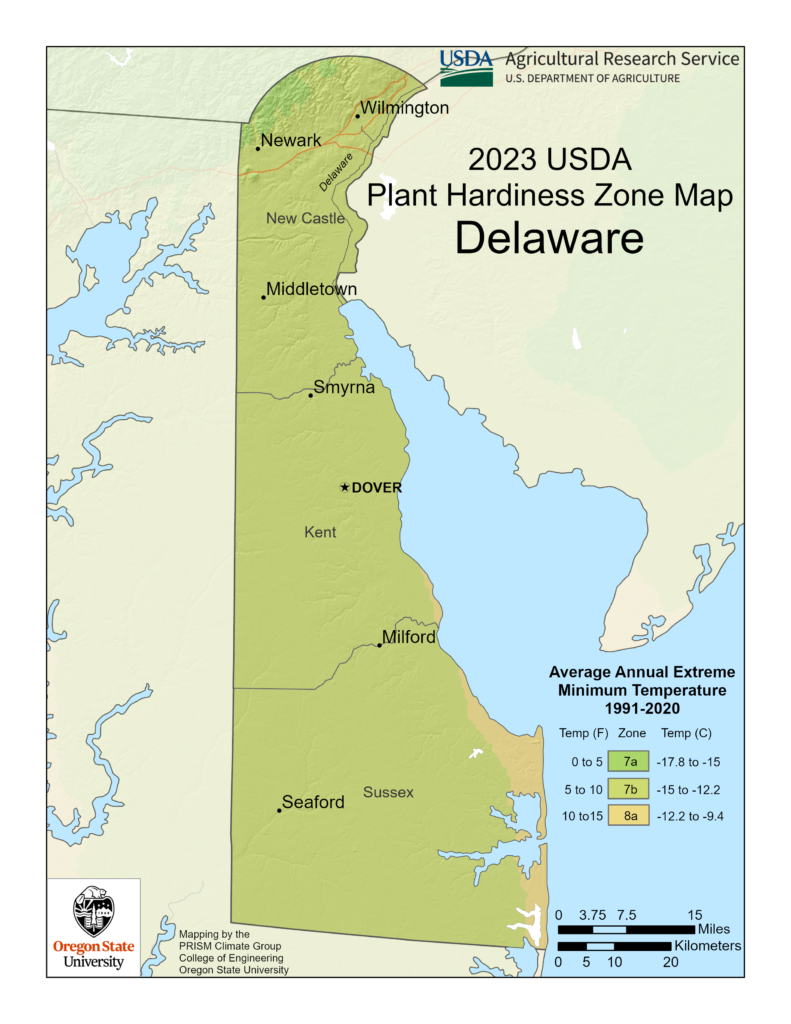
Welcome to our guide on growing palm trees in Delaware! Despite Delaware’s cooler climate, it is possible to cultivate palm trees that will flourish and add a touch of exotic beauty to your landscape.
When it comes to choosing palm tree varieties for Delaware, it’s important to select species that are cold-hardy and can withstand the region’s climate. Some of the best palm tree varieties for Delaware include the Hardy Sabal Palm, the Windmill Palm, and the Needle Palm. These palm trees are specifically adapted to colder temperatures and can handle Delaware’s harsh winters with proper care.
Southern and coastal Delaware fair better than the more Norther and Western parts of the state. These regions will have the best odds of success growing palm trees.
Choosing the Right Palm Tree Varieties
Delaware’s climate may not be as tropical as some other regions, but there are still palm tree varieties that can thrive in its conditions. When selecting palm trees, consider cold-hardy species that can withstand the occasional frost and cold temperatures experienced in Delaware. Here are a few palm tree varieties known for their resilience in cooler climates:
- Windmill Palm (Trachycarpus fortunei): This palm variety is highly cold-tolerant and can survive temperatures as low as 0°F.
- Needle Palm (Rhapidophyllum hystrix): Known for its hardiness, the needle palm can withstand temperatures as low as 0°F.
- European Fan Palm (Chamaerops humilis): This compact palm variety can tolerate colder temperatures and is suitable for smaller gardens.
Before making a decision, consult with local experts or visit a reputable palm tree nursery in Delaware. They can provide further guidance on selecting palm tree varieties that are best suited to the region’s climate.
Maintaining Palm Trees in Delaware
Once you’ve planted your palm trees in Delaware, it’s crucial to provide them with proper care to ensure their continued growth and beauty. By following a few maintenance tasks, you can keep your palm trees thriving in Delaware’s climate.
While palm trees are generally drought-tolerant, they still require regular watering, especially during dry periods. Aim to provide deep watering sessions that penetrate the soil and reach the tree’s root system. This encourages strong root growth and overall health.
Another crucial aspect of maintaining palm trees in Delaware is fertilizing. Apply a balanced, slow-release palm fertilizer during the growing season to provide the necessary nutrients. This helps promote healthy foliage and robust growth.
Our recommended palm fertilizer:
During the winter months, protecting your palm trees from cold temperatures is vital. Delaware’s climate can be challenging for some palm tree varieties, but there are cold-hardy options available. Consider planting cold-tolerant palm tree species, such as the Windmill Palm (Trachycarpus fortunei) or the Needle Palm (Rhapidophyllum hystrix), which can withstand harsh winter conditions.
Protect your palms with hardy frost cloth:
FAQ
What are the best palm tree varieties for growing in Delaware?
Some of the best palm tree varieties that can thrive in Delaware’s climate include the Windmill Palm (Trachycarpus fortunei), Needle Palm (Rhapidophyllum hystrix), and Dwarf Palmetto (Sabal minor). These varieties are known for their cold-hardiness and ability to withstand the winter temperatures in Delaware.
How do I take care of palm trees in Delaware?
Proper care is crucial for maintaining healthy palm trees in Delaware. Water your palm trees deeply but infrequently, allowing the soil to partially dry out between waterings. Fertilize the palm trees regularly with a slow-release palm fertilizer to provide them with essential nutrients. Protect your palm trees during the winter months by wrapping them in burlap and adding mulch around the base for insulation.
Can palm trees survive cold temperatures in Delaware?
Yes, there are cold-hardy palm tree varieties that can survive the winter temperatures in Delaware. These varieties have adapted to withstand colder climates and can tolerate freezing temperatures. By choosing the right palm tree variety and providing proper care, you can enjoy beautiful palm trees in your Delaware landscape year-round.
